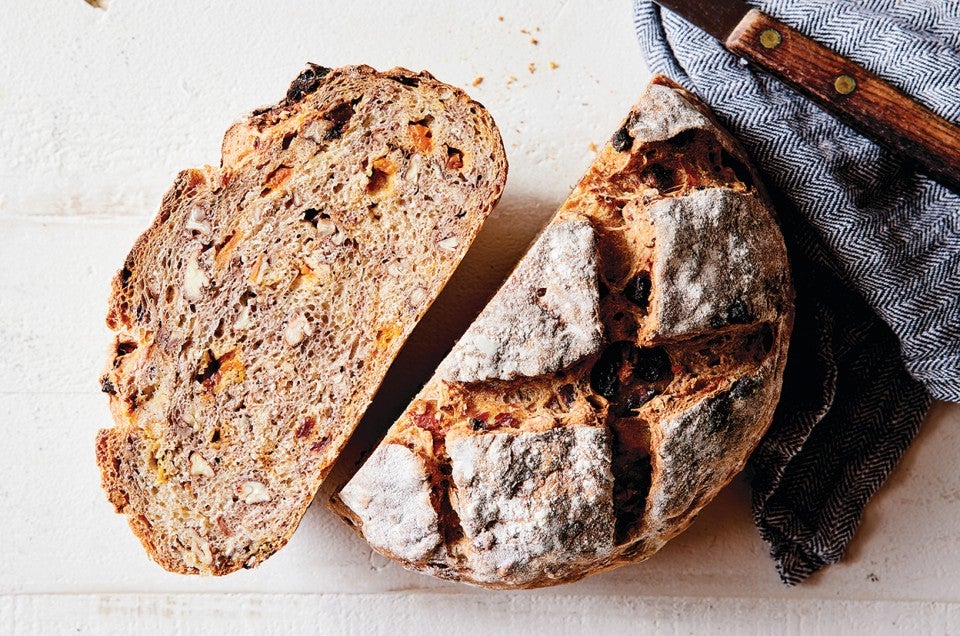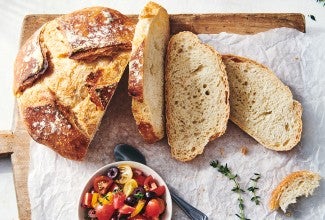Can I make any bread recipe a no-knead recipe?
Yes! (Mostly.) Here’s how to adapt a recipe to skip the kneading.


 The bakers of King Arthur are here to solve the kitchen conundrums you share with us, whether it’s on the phone, computer, or by the good old postal service. In Ask the Baker’s Hotline, Annabelle will pick the brains of the talented King Arthur Baker’s Hotline team to tackle some of your most-asked questions.
The bakers of King Arthur are here to solve the kitchen conundrums you share with us, whether it’s on the phone, computer, or by the good old postal service. In Ask the Baker’s Hotline, Annabelle will pick the brains of the talented King Arthur Baker’s Hotline team to tackle some of your most-asked questions.
* * *
It’s easy to see the appeal of the “no-knead” approach in bread baking: minimal effort produces maximum flavor. By simply mixing up your dough and giving it an extended rising period, you can enjoy gorgeous, golden loaves without having kneaded a thing.
The no-knead method is so great that after trying one such recipe, you might think, “Hey! I should make all my bread this way and save myself a lot of work.” I’m reaching out to Tess of our Baker’s Hotline to see if it’s possible.

“The purpose of kneading dough is to develop gluten, providing your dough with strength,” says Tess. “Agitating your dough through folds and stretches creates an overlapping network of proteins called gluten. This strong mesh-like network traps the gas produced by yeast, allowing dough to rise.”
But agitation (kneading) isn’t the only way to develop that gluten. As Tess explains, “Another method of forming gluten — with minimal agitation — is time. This is a process called passive gluten development, and it’s the magic behind many no-knead doughs.” That’s why most no-knead recipes include a long, slow rise — the dough needs time to fully allow the gluten to develop. As a result, a no-knead recipe will typically include only a small amount of yeast so the dough can rise slowly over an extended period of time.
This method works beautifully in two King Arthur favorites: Neapolitan-Style Pizza Crust and No-Knead Harvest Bread. “Both recipes instruct the baker to briefly mix the ingredients and let the dough sit overnight on the countertop. While the small amount of yeast begins its slow fermentation, the gluten passively develops strength. The next day, the dough is active, risen, and ready to shape,” explains Tess.

You have options! Consider one of the following techniques recommended by Tess:
1) Reduce the yeast significantly (try 1/4 teaspoon for every 3 cups [360g] of flour); mix (don’t knead) your dough; and allow it to complete its first rise at room temperature for at least 8 hours or overnight. When the dough looks bubbly and has elasticity to it, move on to shaping and the second rise.
2) Keep the yeast amount the same; mix (don't knead) your dough; let it rise at room temperature until doubled, then refrigerate for at least 4 hours (though Tess says 8 to 12 hours is ideal). This technique is a good option for enriched doughs that include eggs, as raw dough with eggs in it should not be left at room temperature overnight.
Says Tess, "Some doughs do require the strengthening that comes from kneading." Bagels, for example, would benefit from some hands-on or machine kneading. They could be made using the no-knead method, but the texture would likely be more akin to regular bread than a dense, chewy bagel.

If you’re new to no-knead breads and want to give it a try, Tess recommends starting with our 2016 Recipe of the Year, No-Knead Crusty White Bread. “The recipe is quite simple, yet yields an excellent, crusty, artisan loaf with a light, open crumb,” she raves.
Which no-knead recipe will you be baking next? Let us know in the comments!
Got a question you'd like answered? Drop it in the comments below, and I’ll see you next time with more baking insights from the King Arthur Baker’s Hotline!
Cover photo (No-Knead Harvest Bread) by Kristin Teig.


